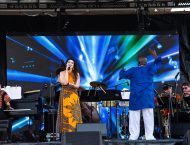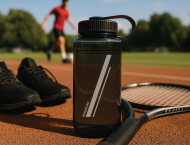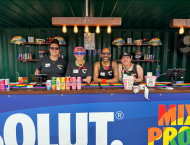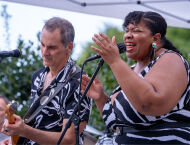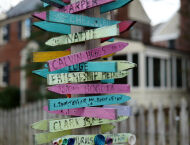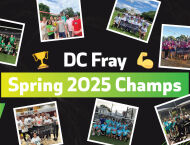Drink
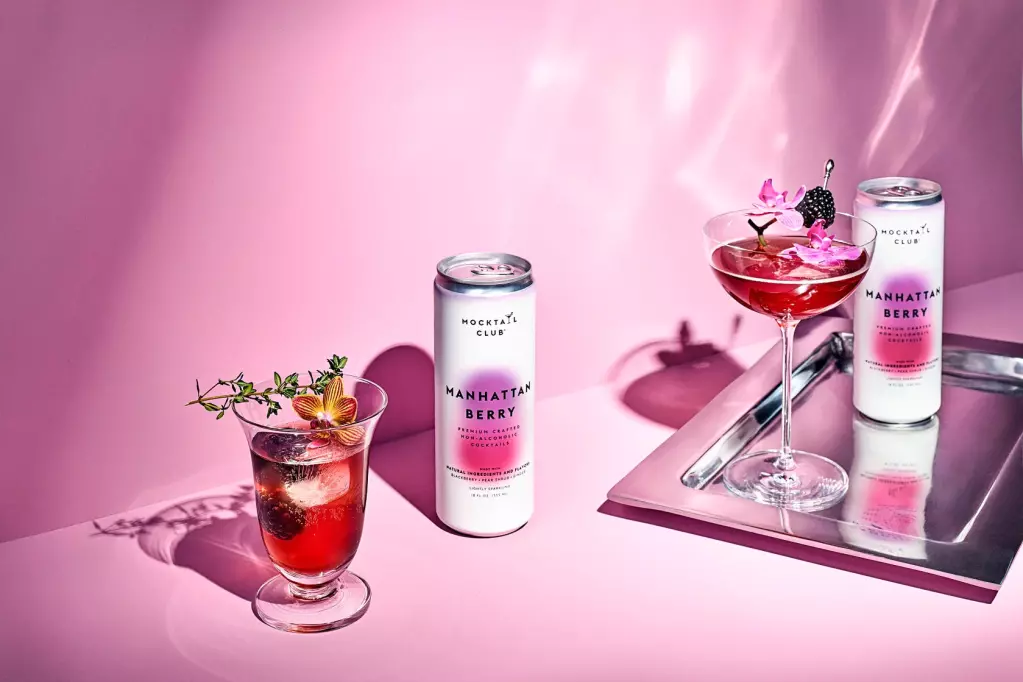
Gearing Up for Dry January? Here’s Where to Find Zero-Proof Sips in the DMV
December 26, 2023 @ 12:00pm
With the holiday finished and Dry January right around the corner, the non-alcoholic movement is back in the spotlight. We chatted with Laura Silverman on where to find delicious zero-proof options in D.C. and beyond.
Non-alcoholic and low proof spirits and drinks have been on the rise over the last couple of years due to months such as Dry January and Sober October. Additionally, brands such as Kin and Ghia are also giving people alternative options to the traditional wine or beer. D.C., in particular, has been a hub for the movement over recent years. We sat down to talk to Laura Silverman, founder of Booze Free in DC and District Fray contributor, to talk about her latest project Zero Proof Nation, the non-alcoholic movement, and more.
District Fray: What exactly is Zero Proof Nation for anybody who might not know what it is?
Laura Silverman: The very long answer to what Zero Proof Nation is, it’s really hard to sort of condense it into one little thing, but I would call it a global non-alcoholic resource hub. It started as an Instagram where I wanted to feature founders in the industry who were starting non-alcoholic beverages pre-pandemic. So, essentially at a time where they might’ve been a little more profitable starting an alcoholic brand.
I wanted to know what their why was. Why would they start a non-alcoholic beer? Why would they start a wine or even a tea-based seltzer? What was their why?
Then it grew to a directory of beverages and as 2020 progressed, it started to grow into this growing, but small, directory of shops, bars, and popups, especially as pandemic restrictions started to lift. So I was noticing for a wide variety of reasons that there were more and more solely non-alcoholic, brands, places, people, and establishments. I wanted to create some sort of a solution so people wouldn’t have to spend hours on the internet trying to find something they could go to. If they found their way to zeroproofnation.com, they could hopefully find a bunch of resources that could be a launching point to more discoveries.
Drinking was really big during the pandemic and when everybody was in quarantine, but there were also a lot of non-alcoholic options for you to purchase.
For many people, they were finding that they didn’t have the social pressures of going out with friends, they didn’t have work happy hours or all of these like institutional places and spaces where drinking alcohol is and was socially acceptable.
And certainly, this is not coming from a lens of prohibition, but coming from a lens o health and wellness and mindfulness. So, you know, just, just as many people were saying, “Oh, well, you know, I don’t have to drink with or match the people that are around me. Maybe I can drink a little bit less and discover some options that are more to my liking.”
At the same time, I think with shipping restrictions there were a lot of brands that, that were alcoholic brands, or maybe people who were in alcoholic brands, really had to pivot and, and start something non-alcoholic so that they could ship direct to consumer. A lot of this [non-alcoholic industry] started very much as a direct to consumer industry. So, a lot of brands got to know their consumers in ways that they might not have if they had launched directly in a retail space.
This is a little of a new topic, but I’ve noticed, especially on Instagram, I believe the brand is Ghia. They’re all over Instagram with influencers. I think it’s helpful especially because especially when you’re [college age], it can be really hard to say no to drinking when you’re in those social spheres.
Yeah, a hundred percent. I don’t know what it is like on college campuses right now. I mean, I don’t think I was particularly looking for non-alcoholic options when I was in college. But it was also a different time. It wasn’t that long ago in, in the scheme of like history, but 20 years ago was a much different time and people weren’t really interested in health and wellness necessarily — at least at that young of an age. It was more about, you know, rebelling and just trying to assert independence.
There also wasn’t really much of any alternative except for like soda, milk, water. So even if you wanted an alternative, it wasn’t that great. So, I don’t know how many college kids are, drinking like adult non-alcoholic beverages, but it’s certainly a good option to have is like something to alternate with or at least for weeknight drinking.
I don’t know how big this movement is necessarily going to take off at college campuses right now. But Gen Z, post-college anyway, are really into non-alcoholic beverage. They are driving some serious growth which is interesting and great to just have young people drink less alcohol. Again, we’re not talking about creating a nation of prohibitionists, but at its core, alcohol is a drug.
Do you think that now that we have those terms and they’re kind of in the mainstream enough that people know about it, that younger people go towards it because there’s a definite term that they’re kind of falling under?
Yes, absolutely. What’s not in someone’s consciousness is really sort of hard to attain in any other way. Having these, these terms out there, it doesn’t just bring it into the forefront. It doesn’t just bring it into people’s consciousness. It also gives these young people and gives anyone, frankly, like people who are in their fifties, sixties, seventies, or any, any kind of age, it gives people the permission to do, to drink less, to find alternatives.
If other people are doing it, you’ll feel more comfortable doing it if you’re not the only person out there doing it. So having these terms sort of exist and be out there and have established months where it’s socially acceptable to not drink alcohol, if anything, it’s kind of cool to do it during Dry January or sometimes Sober October or Dry July. But especially dry January, it becomes this cool thing. So, the more people we can get to experience that “cool thing,” the more people will have had a taste of drinking less, of trying these non-alcoholic options, and hopefully they’ll take that with them the rest of the year.
It doesn’t mean they have to be sober the rest of the year or the rest of their lives now. It just means that they’ll have that awareness now that when they do drink alcohol, they’ll be like, “Oh, well that seed was planted in January. I felt really good not drinking or Dry January.” They’re just drinking less. Maybe they’re not drinking at all during the week. Maybe they have a few drinks on the weekend instead of going crazy like they might have before. But it’s just an introduction into moderation, into what a lot of medical communities call “harm reduction,” but, you know, not consuming as much alcohol. And I think ultimately that’s what these months really do well, and they help people.
I actually have a friend who has lived here for a lot longer, and she said that even five years ago, D.C. was a lot more of a heavy drinking town than it is now.
D.C. is definitely like becoming a hub on the spoke of the wheel, so to speak. You know, we’ve got Derek Brown, who had Columbia Room for so many years that had, a just a beautifully crafted, inclusive menu of full low and no proof options. He and his partner Maria are bringing the Mindful Drinking Fest to DC for the third time in January. It’s gonna be bigger than it was last year, and last year was pretty big. But DC is, you know, just one of many places across the country.
To keep up with Zero Proof Nation and Booze Free in DC, be sure to follow them on Instagram @boozefreeindc. Check out their website boozefreeindc.com to learn more about non-alcoholic and low proof brands as well as places that offer them in the DMV.
Want to hear more from local D.C. businesses? Join the District Fray community for exclusive access to trailblazers in the area. Become a member and support local journalism today.


